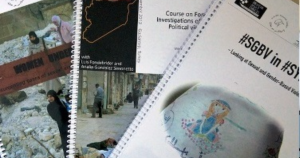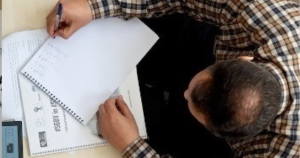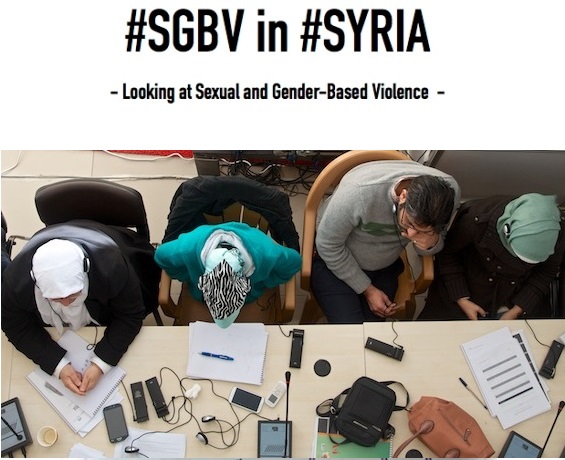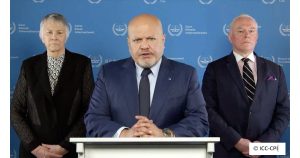Gaziantep, Turkey – 1 February 2014
“There cannot be lasting settlement in Syria that does not involve Syria’s women at every stage of the process with full participation in the peace process and in the future governance of Syria”. These the words used by William Hague, UK Secretary of State for Foreign and Commonwealth Affairs, during the High Level Meeting of the Geneva II Conference for the Syria Peace Process, on 22 January 2014.
The inclusion of women in the peace process is critical to ensure equality and that all voices with a stake in the process are heard. Women and children are the principal victims of systematic violence and crimes being committed in Syria, as attested by the dramatic realities of Syria’s displaced communities and refugees, abductions and disappearances and other crimes. Yet most of the time they are silent and risk being forgotten, particularly in the corridors of power.
The only way to avoid this situation is to promote awareness. It is critical to ensure effective support and organise proper documentation and monitoring of these issues, in order to build up an accountability system, ensuring perpetrators face justice and the experiences of women and children are not forgotten in the post-conflict world as well.
This is the main aim of the training “#SGBV in #SYRIA – looking at Sexual and Gender-Based Violence”, held in Gaziantep between 28 January and 1 February 2014 and organised by No Peace Without Justice in partnership with Kirkayak Art Center and the Violations Documentation Center with the support of the Foreign and Commonwealth Office and the Italian Ministry of Foreign Affairs.
The SGBV course provided in-depth training on sexual and gender-based violence, examining the practical situation on the ground and the needs within Syria against the backdrop of international human rights and humanitarian law and monitoring tools for human rights violations. For this purpose, the training provided techniques and mechanisms of securely monitoring sexual and gender-based human rights violations to support on-going and future efforts of accountability in Syria.


The training revolved around a scenario on sexual and gender-based violence in Syria, which was constructed on the basis discussions with participants on day one of the training. This scenario underpinned the remainder of the training course, providing a practical set of facts through which participants examined the various international and Syrian laws and standards that can help combat and address sexual and gender-based violence. These included international humanitarian and human rights instruments, and their national equivalents, to acquaint participants with the international and Syrian legal framework. Presenters used these discussions to explore effective implementation before international and national criminal courts and other accountability mechanisms, especially on sexual and gender‑based violence.
The training examined the collection, evaluation and secure storage and dissemination of information, to provide participants with concrete and effective practical skills that can be useful in their daily work on the ground.
Part of the agenda focused on security awareness and the identification of trauma to enhance the ability of human rights activists and their interlocutors to work on sexual and gender-based violence safely and securely.
Documentation:
- Download the Report on the training “#SGBV in #SYRIA – looking at Sexual and Gender-Based Violence”
- Visit the special page dedicated to NPWJ’s Syria Program on Justice and Accountability
NPWJ’s Syria Project on Justice and Accountability
This four-day training course is part of an NPWJ project aimed at reducing the expectation and rewards of impunity and at building a culture of accountability. The purpose is to equip citizens to demand accountability and justice for violations taking place on a daily basis for the past two and a half years and, at the same time, to equip the judiciary and legal profession to answer that demand.
The mainstay of the project is a series of advocacy and training events, which are being held in Gaziantep, Turkey, near the Syrian border, with Syrian judges, lawyers and civil society activists from Syria who can bring the skills and (perhaps more importantly) aspirations for justice back to their work and their constituents inside Syria.
The long-term goal of this project is to promote democracy and human rights protection through incorporating justice and accountability in decision-making on conflict resolution and stability, development, and reconstructing planning in Syria. The project’s strategic objective is to support Syrian civil society playing an active role on justice and accountability issues, including advocacy and documenting human rights violations, including receiving, gathering, collecting, collating, processing and securely storing information, documentation and materials and analyse it for the purpose of establishing what happened and reconstructing decision-making processes that resulted in violations international humanitarian and human rights law in Syria since March 2011.
Recent events:
- Commemoration of the Queiq River Massacre, Istanbul, Turkey 29 January 2014
- Training Course on “Digital Security”, Gaziantep, Turkey 14-16 January 2014
- Training course on “Documenting Violations Against Women”, Gaziantep, Turkey, 9-12 December 2013
- Training Course on “Forensic Investigations of Cases of Political violence”, Gaziantep, Turkey, 25-29 November 2013
- Side event on “Accountability for Syria”, The Hague, 12th ASP to the ICC, 23 November 2013
- Training course on “Chemical weapons awareness and documentation”, Gaziantep, Turkey, 7-12 October 2013
For further information, contact Hadi Al-Khatib on hadi@npwj.org or Nicola Giovannini on ngiovannini@npwj.org or +32-2-548-3915.




